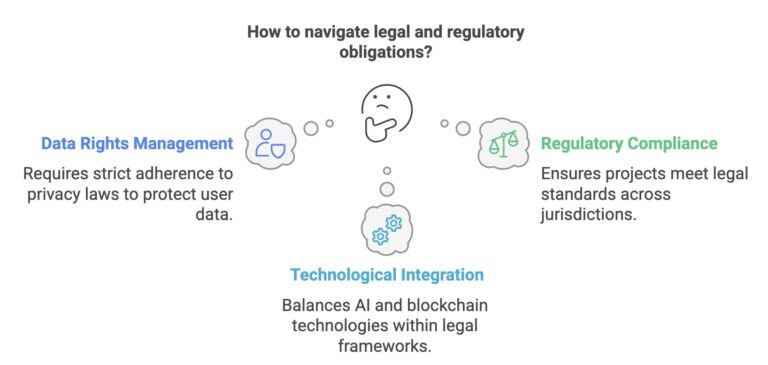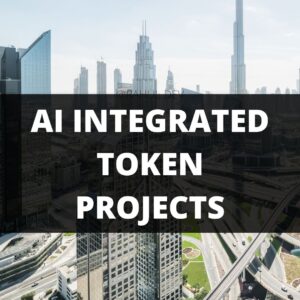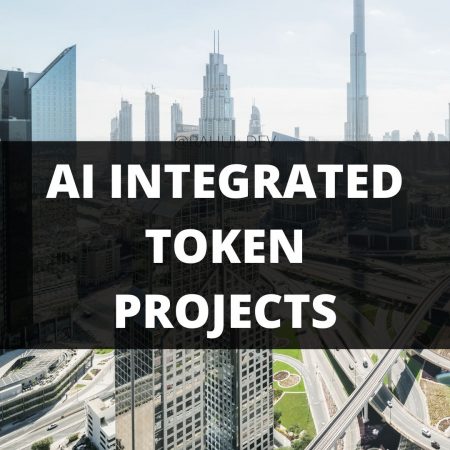AI Token Projects
Explore the best practices for launching new projects

Understand Practical Aspects
Understand the role of legal analysis

Explore the best practices for launching new projects

Understand the role of legal analysis

Protect your innovations across multiple countries and create strong patent portfolio to boost business valuation
Local and global brand protection through international trademark registrations
Extensive research and business writing for technical whitepapers and B2B content products
Here I write about writing legal opinion letters for AI Token Projects and AI crypto projects with AI assets and AI coins for regulatory compliance. AI token projects face an intricate matrix of legal and regulatory obligations across multiple jurisdictions worldwide. These innovative AI ventures, combining artificial intelligence capabilities with blockchain-based tokens, must navigate complex regulations governing both technologies simultaneously. The current regulatory landscape presents challenges in three critical dimensions that demand comprehensive legal opinions. Data rights management requires strict adherence to privacy laws such as GDPR and CCPA, particularly regarding user consent, data minimization, and cross-border transfers.
In use, the token classification necessitates careful analysis under securities laws like the Howey Test and emerging frameworks such as the EU’s Markets in Crypto-Assets Regulation (MiCA). Projects must implement a structured compliance framework addressing jurisdiction selection, token functionality assessment, AI risk classification, data protection measures, and ongoing regulatory monitoring. Research indicates that proactive legal compliance not only mitigates enforcement risks but creates strategic advantages through enhanced user trust and expanded market access. This article presents a comprehensive roadmap for founders to obtain necessary legal opinions and implement compliant AI-token systems.
This article covers following topics:
AI Token Projects Case Studies
Data Rights and Privacy Compliance for AI Token Projects


AI token projects represent the convergence of two transformative technologies, each subject to rapidly evolving regulatory scrutiny. These ventures embed artificial intelligence capabilities within blockchain token ecosystems, creating unprecedented challenges for legal compliance. The European Union’s Artificial Intelligence Act, implemented in 2024, establishes strict requirements for high-risk AI systems, including detailed risk assessments and transparency measures. Simultaneously, token projects must navigate the complex landscape of securities regulations, with authorities like the U.S. Securities and Exchange Commission applying the Howey Test to determine if tokens constitute investment contracts. The intersection of these regulatory domains creates unique compliance obligations that few legal frameworks directly address.
The absence of clear regulatory guidance specifically targeting AI-token integration necessitates comprehensive legal opinions across multiple dimensions. Project founders must understand how AI functionality might affect token classification, how data privacy laws impact AI training and operation, and what transparency requirements apply to automated systems making consequential decisions. A legal opinion provides authoritative guidance on these questions, helping projects avoid costly enforcement actions and protecting stakeholders from unforeseen liabilities. The risks of non-compliance are substantial, including regulatory investigations, financial penalties, and potential project shutdown.
The recent case studies highlight these challenges. The Virtuals Protocol, which tokenizes AI agents for autonomous commerce, faced scrutiny under securities laws due to its fractional ownership model that resembles investment contracts. Worldcoin encountered privacy investigations across multiple European jurisdictions for its collection of biometric iris data in exchange for token distribution. Meanwhile, regulatory authorities have increased enforcement against misleading AI claims, with the U.S. Federal Trade Commission launching Operation AI Comply to target deceptive AI marketing practices. These examples demonstrate that regulators are actively monitoring the AI-token space and will not hesitate to enforce existing laws despite technological novelty.
This article examines three critical dimensions requiring legal opinions for AI-integrated token projects. Data rights compliance establishes the foundation for lawful AI operation, ensuring proper handling of user information and training data. Algorithm transparency requirements address the growing demand for explainable AI and truthful representation of capabilities. Token classification analysis determines whether tokens function as securities, utilities, or other regulated instruments across jurisdictions. The integration of these dimensions requires a holistic approach to legal compliance that few projects have successfully implemented. By understanding these requirements and implementing a structured framework, founders can navigate the complex regulatory landscape while fostering innovation in this emerging field.
Data serves as the lifeblood of AI token systems, making data rights and privacy compliance fundamental for AI-integrated token projects. These ventures must address multiple data dimensions across user interactions, AI training, and blockchain operations. The General Data Protection Regulation (GDPR) establishes the global gold standard for privacy protection, requiring a valid legal basis for processing personal data and granting users specific rights over their information. AI token projects collecting European user data must implement comprehensive consent mechanisms, data minimization practices, and user control interfaces. A project that fails to provide these protections risks regulatory investigations and fines reaching 4% of global annual revenue. The California Consumer Privacy Act similarly requires businesses serving California residents to provide transparency notices and opt-out mechanisms for personal data collection.
The user privacy and consent represent critical challenges for AI-token projects operating across borders. The collection of personal data for personalized AI services, user identification, or community governance must occur lawfully and transparently. GDPR Article 22 specifically restricts fully automated decisions that significantly affect individuals, potentially requiring human review or explicit consent for AI-driven determinations. For example, an AI system automatically determining token rewards or access privileges would trigger these requirements. Projects must implement clear consent flows, explaining to users how their data will be used in AI training and blockchain transactions. The consent process must be granular, allowing users to approve specific data uses rather than presenting all-or-nothing choices. Legal opinions should assess whether the project’s consent mechanisms satisfy regulatory requirements across all operating jurisdictions.
Training data for AI models raises complex intellectual property and contractual issues beyond personal data concerns. Projects must verify they possess proper rights to use all data feeding their algorithms. Scraping online content without permission could violate website terms of service or copyright protections, particularly for non-factual creative works. AI-token ventures should conduct comprehensive IP audits of training data sources and secure appropriate licenses for proprietary information. Some projects mitigate this risk by using only open data or content contributed by users with explicit permission, often incentivized through token rewards. Additionally, outputs generated by AI systems may themselves create new IP issues, requiring clear policies on ownership and usage rights. Legal opinions must analyze these training data sources and recommend appropriate licensing structures to avoid infringement claims.
Cross-border data transfers add another layer of complexity for globally distributed AI token systems. The GDPR restricts transferring personal data to jurisdictions lacking “adequate” protection, creating challenges for blockchain networks operating across multiple countries. A project with nodes processing European user data in non-EU countries must implement appropriate safeguards, such as Standard Contractual Clauses or Binding Corporate Rules. The decentralized nature of blockchain technology complicates this requirement, as personal data stored on-chain could potentially be accessed by nodes worldwide. Projects must carefully design their architecture to either keep personal data off-chain or implement encryption and privacy-preserving techniques for on-chain storage. Legal opinions should address these cross-border transfers and recommend compliant technical measures for global operations.
The privacy-by-design principles represent best practices that increasingly appear in regulatory requirements. AI-token projects should minimize data collection to necessary elements, implement data anonymization or pseudonymization where possible, and build privacy protections directly into technical architecture. Conducting a Data Protection Impact Assessment (DPIA) provides a structured methodology for identifying and mitigating privacy risks before launch. This assessment becomes mandatory under GDPR for high-risk processing activities like large-scale profiling or biometric data collection. The assessment should document all data flows, processing purposes, security measures, and potential risks to user rights. A thorough DPIA demonstrates regulatory compliance and often reveals potential vulnerabilities that can be addressed before they become liabilities. Legal opinions should include an evaluation of whether the project requires a formal DPIA under applicable regulations and provide guidance on implementing privacy-by-design measures.
The truthful representation of AI capabilities in project documentation represents a critical compliance area receiving increased regulatory attention. Founders must avoid “AI-washing” – inflating or misrepresenting AI capabilities to generate investment interest or user adoption. The SEC recently charged investment advisors for falsely claiming to use sophisticated AI trading algorithms when no such technology existed, explicitly warning against “AI washing” as a deceptive practice. AI Token projects, which often raise funds through whitepapers and token sales, must ensure all statements about their AI functionality are accurate and supported by evidence. Unsubstantiated claims about AI performance, consistency, or capabilities could constitute securities fraud if they induce investment based on false pretenses. The legal opinions for AI tokens should include a thorough review of all marketing materials and technical documentation to identify potential misrepresentations or exaggerations of AI functionality that could trigger regulatory scrutiny.
In summary, AI-token ventures must embrace transparency and accountability as core operating principles rather than compliance burdens. This requires clear documentation of algorithms for both users and regulators, truthful marketing of AI capabilities, appropriate governance structures for oversight, and ongoing monitoring of system performance. Legal opinions should assess the specific transparency obligations based on the AI’s risk level and functionality, recommending appropriate technical and organizational measures to satisfy regulatory requirements. By building explainable, auditable systems that accurately represent their capabilities, projects not only avoid enforcement actions but establish credibility with users and regulators in this rapidly evolving field.

As a business coach and thought leader, I cannot emphasize enough the importance of innovation, new software patents, mobile apps, and patents for tech companies, startups, and entrepreneurs. The world is rapidly evolving, and staying ahead of the curve is vital for success. Embracing technological advancements such as blockchain and AI can unlock unprecedented opportunities, streamline operations, and propel businesses into the future with competitive valuation via intangible assets.
Click Here for AI Startup Valuation Guide.
For instance, blockchain technology can revolutionize supply chain management and secure data sharing wherein innovative business models are explained to the audience via technical whitepapers, while AI can automate and optimize decision-making processes. Mobile apps are no longer just a luxury; they have become essential tools for engaging customers and offering personalized experiences. Furthermore, securing digital innovation patents is crucial for protecting intellectual property, fostering innovation, and maintaining a competitive edge. By investing in these areas, businesses can position themselves as industry pioneers and pave the way for a prosperous future after thoroughly conducting the due diligence and reviewing the legal opinion letters, which in case of digital assets can assist in determining the tokens as utility assets or coins as utility tokens before listing the assets at an exchange.
Our team of advanced patent attorneys assists clients with patent searches, drafting patent applications, and patent (intellectual property) agreements, including licensing and non-disclosure agreements. Advocate Rahul Dev is a Patent Attorney & International Business Lawyer practicing Technology, Intellectual Property & Corporate Laws. He is reachable at rd (at) patentbusinesslawyer (dot) com & @rdpatentlawyer on Twitter.
Quoted in and contributed to 50+ national & international publications (Bloomberg, FirstPost, SwissInfo, Outlook Money, Yahoo News, Times of India, Economic Times, Business Standard, Quartz, Global Legal Post, International Bar Association, LawAsia, BioSpectrum Asia, Digital News Asia, e27, Leaders Speak, Entrepreneur India, VCCircle, AutoTech).
Regularly invited to speak at international & national platforms (conferences, TV channels, seminars, corporate trainings, government workshops) on technology, patents, business strategy, legal developments, leadership & management.
Working closely with patent attorneys along with international law firms with significant experience with lawyers in Asia Pacific providing services to clients in US and Europe. Flagship services include international patent and trademark filings, patent services in India and global patent consulting services.
Global Blockchain Lawyers (www.GlobalBlockchainLawyers.com) is a digital platform to discuss legal issues, latest technology and legal developments, and applicable laws in the dynamic field of Digital Currency, Blockchain, Bitcoin, Cryptocurrency and raising capital through the sale of tokens or coins (ICO or Initial Coin Offerings).
Blockchain ecosystem in India is evolving at a rapid pace and a proactive legal approach is required by blockchain lawyers in India to understand the complex nature of applicable laws and regulations.